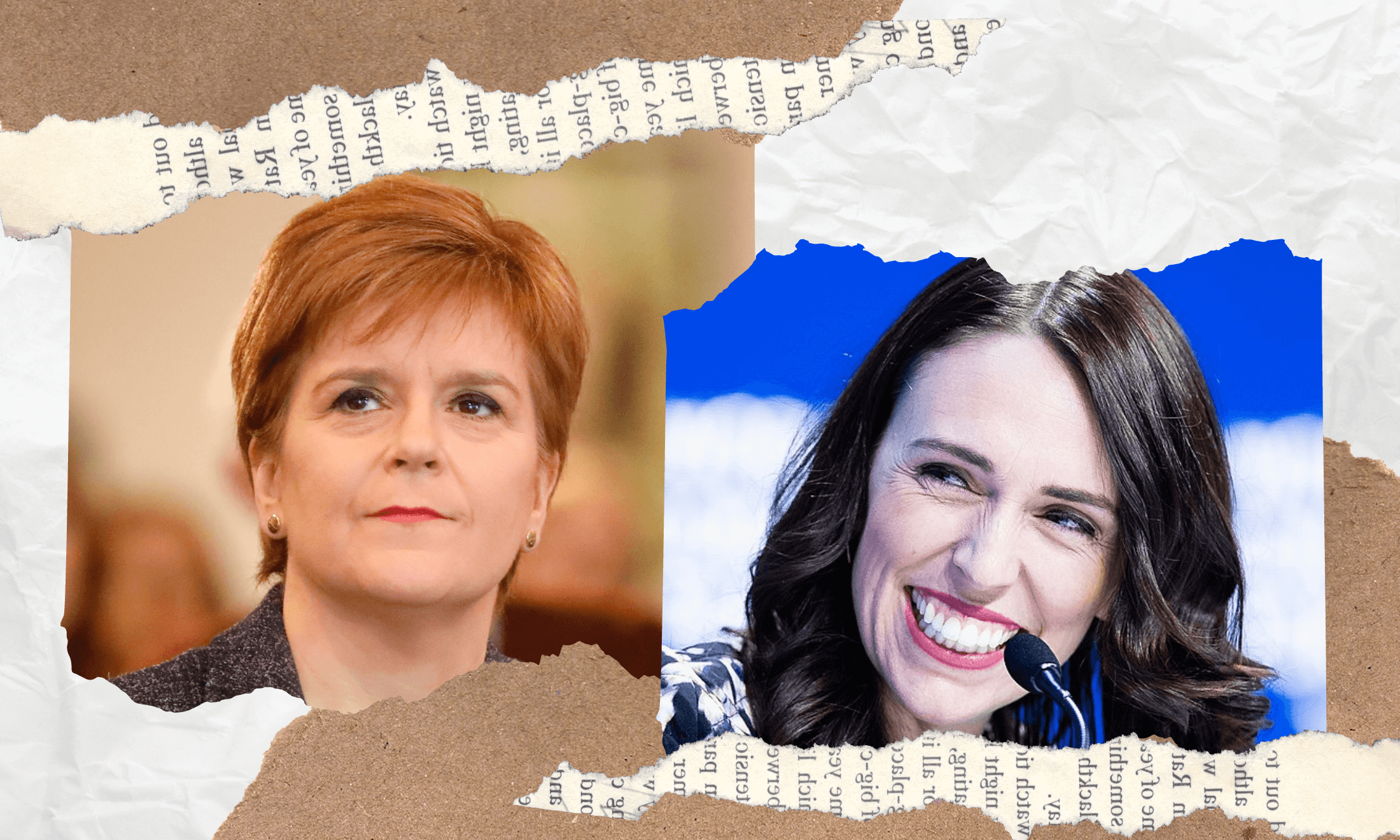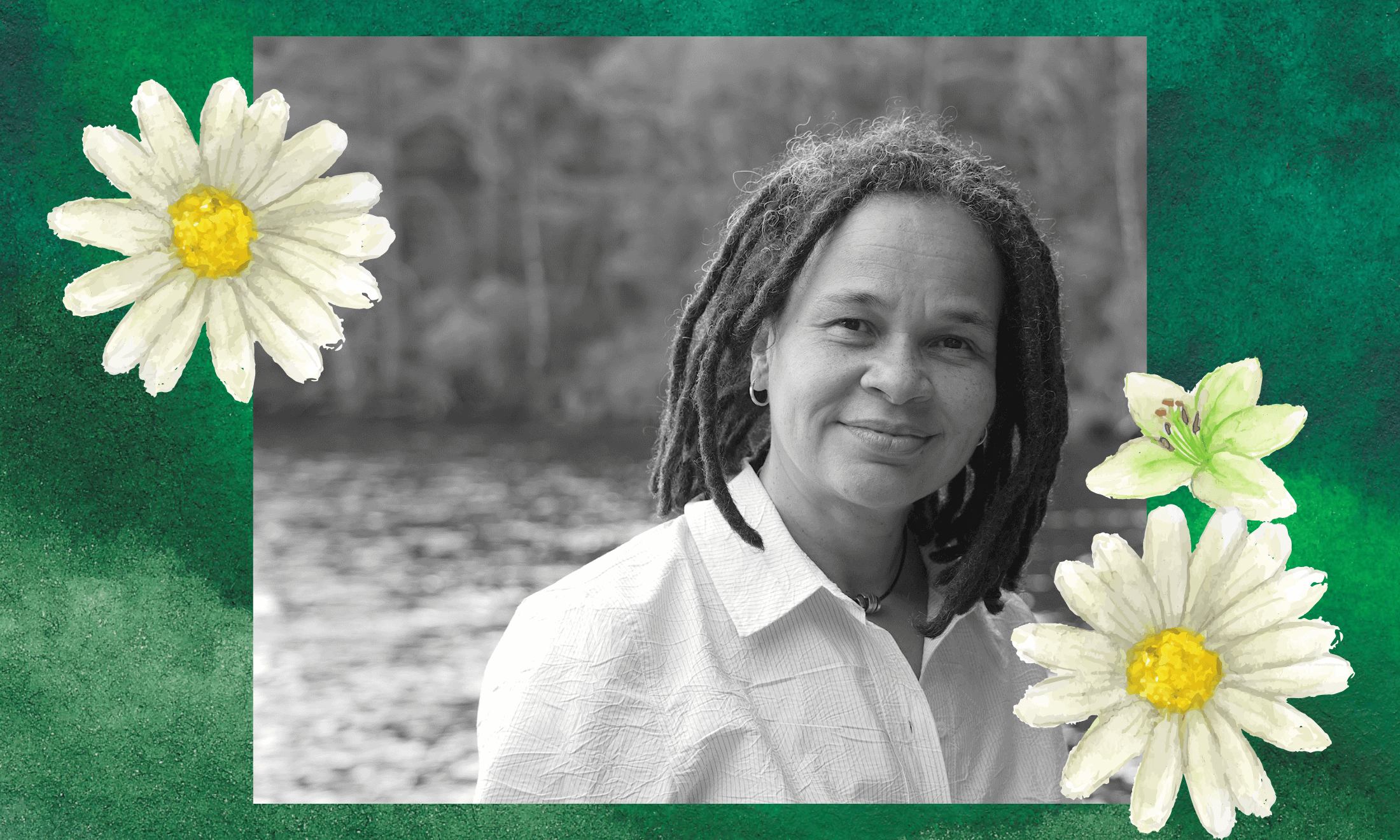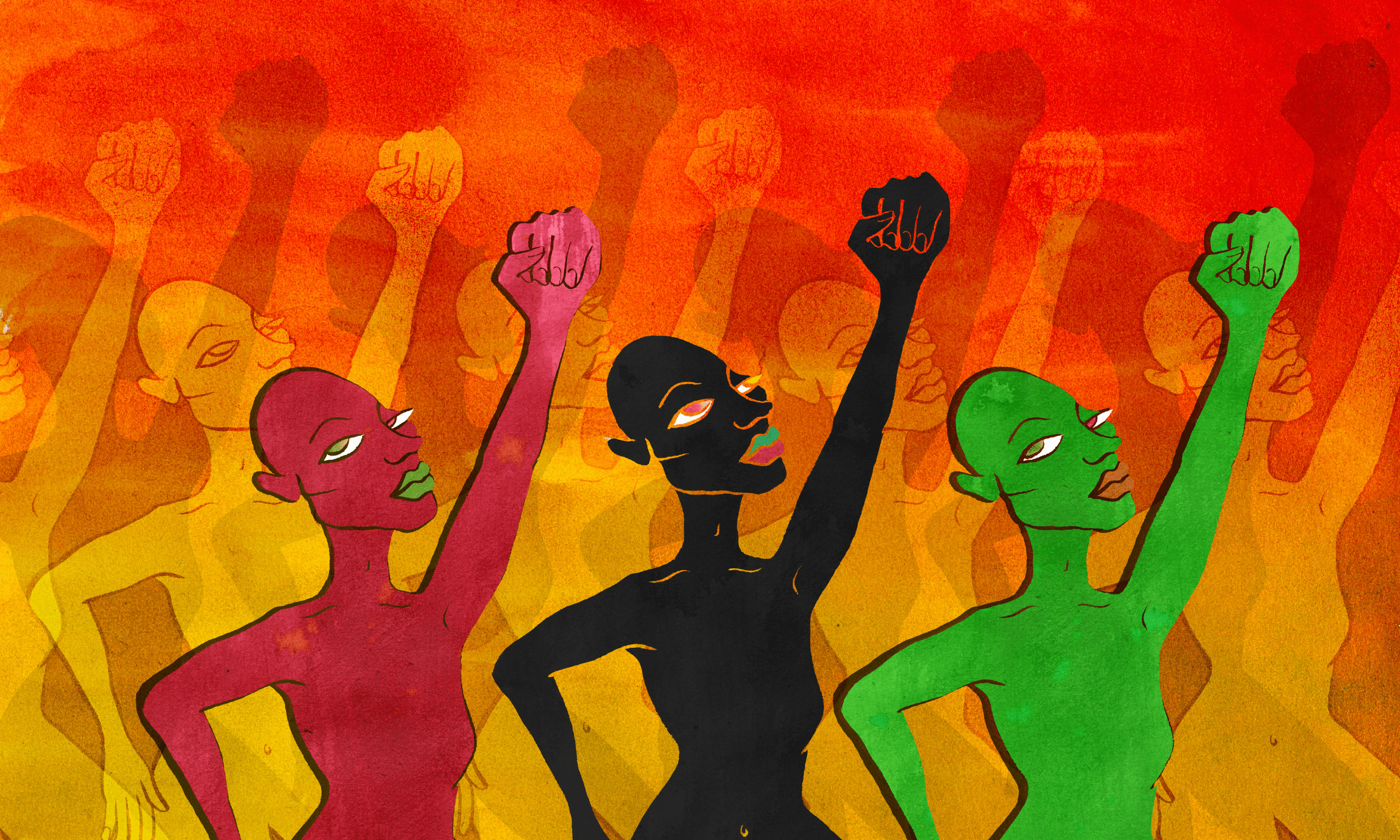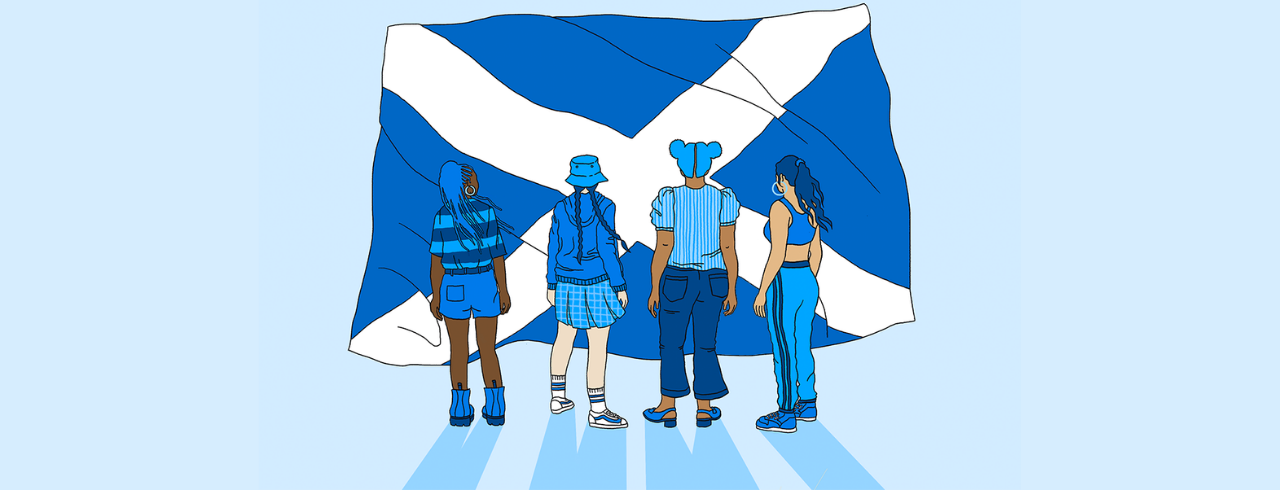
Illustration by Laura Elise-Wright
Is support growing for a radical, anti-racist independent Scotland?
With a surge of support for independence in Scotland against the backdrop of a true acknowledgement of its racist past and present, Eilidh Akilade speaks to people of colour on the front lines of the debate.
Eilidh Akilade
18 Aug 2020
“I just kind of dissociated from it, and was like, ‘This isn’t my fight’,” says Khena Dungu. She was 13 years old during the 2014 Scottish Independence Referendum, having moved from South Africa to Scotland as a child. Amidst applying Maybelline’s ‘Baby Lips’ and the addictive pixels of the Flappy Bird video game, Khena had worries about the possible outcome. “All my friends were very, very pro Scottish independence, I was a bit like yeah, worried that they’d turn on me or whatever.”
In 2014, this sentiment, and other fears, were shared by many. For Khena, and many people of colour in Scotland, an inherently nationalist movement was cause for concern. She feared a growth in hostility towards the racial “Other” was soon to follow. But then Scotland voted against becoming an independent country by 55% to 45%. “Better together” seamlessly slipped out of our vernacular – all was said and done. Scotland remained part of the UK.
But Khena, and others, feel differently now. Polls suggest the Yes vote has surged to a record high of 54% in recent months. “You can kind of see that it should happen – it [Scotland remaining part of the UK] doesn’t make sense,” she says.
The last several months have been a lot. Whether we spent lockdown in the same pyjamas everyday for a week or in jobs paid with propaganda promises, radicalism has rooted itself in our collective psyche. Between the surge in the Black Lives Matter movement and the disproportionate effects of Covid-19 on people of colour, we’ve seen not just increased politicisation but crucially, increased racial politicisation.
This is no different in Scotland. It is not uncommon to see “Yes” stickers, NHS rainbows, and Black Lives Matter posters all in the same tenement block, if not the same window. For Scotland, these are not isolated incidents – they’re all happening at once.
In a bleary-eyed discomfort, Scotland is beginning to confront its racist past and present – and the last few months have been instrumental in that. Despite Scotland’s comparably competent management of the pandemic, the number of Covid-19 deaths in Scotland’s PoC communities remain unclear due to gaps in ethnicity data, leaving unanswered questions about how, and to what extent, PoC have been disproportionately affected. After much pressure, a public inquiry into the death of Sheku Bayoh has been announced. Between the move to change Glasgow’s street names and the dedication of Henry Dundas’s statue to those whose enslavement he contributed to, the growth in the Black Lives Matter movement has made Scotland’s racist history increasingly impossible to shrug off.
“There is an incessant insistence that Scotland is inherently less racist, that Scotland is a victim”
Yet, a stubborn fog of mistruth remains. There is an incessant insistence that Scotland is inherently less racist, that Scotland does not uphold systemic racism, that Scotland is a victim. Scottish exceptionalism has always been an issue – but, arguably, now more than ever.
And so, what does increased racial politicisation mean for Scottish independence? Are we gorging on independence sweet nothings to distract from an ugly past? Or is the movement truly dedicated to anti-racism? Regardless, the Scottish independence movement is growing – and doing so in technicolour.
Minority ethnic groups make up 4% of Scotland’s population, with the Asian population as the largest, making up 3% overall. The community’s support was established in 2014. A poll by Awaz FM, Scotland’s leading Asian radio, showed that 64% of listeners were intending to vote Yes. There is a collective voice emerging from Scotland’s PoC, and its support for independence is becoming increasingly clear.
Lizzay Riungu, 28, one of the organisers of Edinburgh’s Black Lives Matter protest in June, has supported Scottish independence for some time now. Growing up in Edinburgh, she was often one of few black kids in school – isolation paradoxically shared by many black people in Scotland. But the recent protest sounded a collective black Scottish voice – one that was beautiful to hear.
“I personally feel like it was quite Scottish, you know, because everyone was talking about their experiences in Scotland, and how it’s affected them and how we want it to change because obviously we love being citizens here and we love being from here and living here,” Lizzay says. While maintaining solidarity with the movement further afield, the collective Scottishness of Edinburgh’s protests spoke to a strengthening of Scotland’s black voice – a voice which has always been there, but has often been overshadowed. Here, national identity meets racial identity as an intersection, not a conflict. Lizzay’s not a nationalist, but, through her words, what seeps through is love, and what she perceives to be the black Scottish community’s collective love for the country, and a love for their place here.
“The collective Scottishness of Edinburgh’s Black Lives Matter protests spoke to a strengthening of our voice”
But, as “a young black woman in a very white country”, Lizzay knows her love is not shared by all. “Racism is still very much alive and it’s kind of everywhere in Scotland,” she says. This reality – said in a hushed whisper, even after your fifth Tennent’s of the night – puts independence into focus. Despite her support, Lizzay is clear: “an independent Scotland would not solve the race issue.” While a black Scottish voice may be finding itself in multiple movements, independence would not guarantee an anti-racist Scotland. But hope remains.
For Lizzay, this hope comes from the people. “I like to think that we’re all fairly like-minded… We want to be able to have our borders open. We’re a very welcoming country,” she says.
This sentiment is echoed in immigration discourse, a key feature of the independence debate. Currently a reserved issue, Scotland has little control over its immigration policy. Yet, even now, there’s a sense of separation between English and Scottish immigration. Robina Qureshi, director of Positive Action in Housing, speaks of this difference. “We certainly had a kind of pull factor in that many people who are seeking asylum have come up from London deliberately to seek asylum here… they’re aware of a more positive attitude towards refugees,” she says.
But Scotland’s warm welcome can only go so far. Robina continues, “I think there’s a general feeling that it’s a good thing to be in Scotland, but still, you know, Westminster’s power still lies here because asylum seekers are reserved to Westminster so they’re forbidden to work.” Within the union, anti-racist policies struggle to find a footing. Scottish independence offers, but does not guarantee, a home for change.
For refugee and migrant groups, Robina “can’t see any direct vested interest” in Scottish independence, aside from the possibility of better treatment. But this is uncertain. “The proof is in the pudding. Will that be borne out in due course? Who knows.”
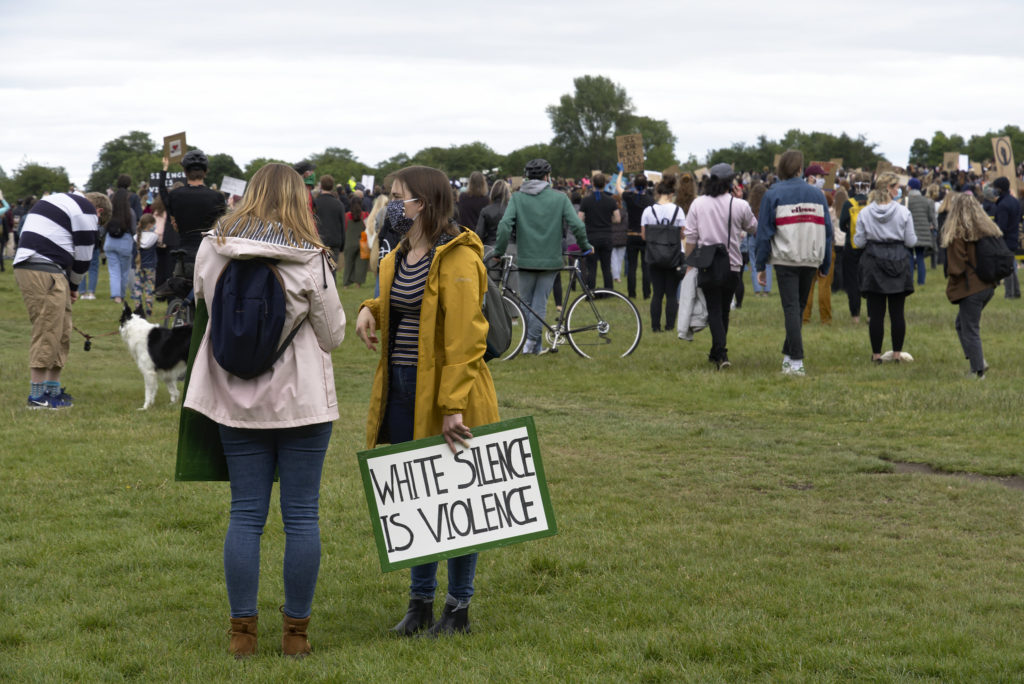
Photography by Magnus Hagdorn via Flickr / Creative Commons
Even now, there is hostility to refugee and migrant groups in Scotland. The last few months have seen opposition from far-right groups towards those protesting the poor living conditions of asylum seekers during lockdown. These groups are a loud minority – but still, they exist. Despite gaining less attention, a somewhat covert, conservative opposition certainly finds its feet within Scotland. There’s a discrepancy between Holyrood’s standpoint and public opinion. In a 2017 YouGov poll, 37% said there were “too many” immigrants in Scotland, 40% said “about right”, and only 10% said immigration was too low. Scotland is not so different from England after all. Seemingly, there’s a patina of liberal welcome – it doesn’t appear hollering ‘God Save the Queen’, but rather emerges as a quiet discomfort which only seeps through the facelessness of polls.
Despite this, for Smina Akhtar – a PhD researcher at the University of Glasgow, looking at state racism in Scotland – the collective action of the people, offers hope. “When we made a call out for people to bring clothes for the refugees that had been moved from Park Inn to other hotels, we were inundated, absolutely inundated. There is hope.” This speaks to a strong, Scottish community, one which opposes far right racism through its ability to support one another.
“A lot of them were basically saying, ‘What about us? We’re not racist. We’ve experienced racism”
But no matter how supportive the Scottish community can be, Smina is aware the lines between Scottish nationalism and racism are often blurred, the two becoming indistinguishable. She discusses the Facebook comments of an article of hers in The National last year. “A lot of them were basically saying, ‘What about us? We’re not racist. We’ve been treated in a racist way, we’ve experienced racism.’ And this was coming from white Scots basically arguing that the English were racist towards Scotland… It’s like that veneer of civic nationalism gets stripped off, or gets peeled off, to reveal a Scottish racism which is specific to Scotland because it’s using a Scottish nationalism in its racism.”
The inclination of some to position the country as a victim is somewhat misconstrued. Scotland is not subject to systemic and sustained racist systems at the hands of England. Scotland is, like England, a majority white country – however fraught tensions are, race doesn’t come into it. This framing distracts from the very real issue of racism in Scotland. Scotland’s history with England is a complex one, but not a racist one.
Scottish national identity oftentimes defines itself in relation to England: England as “them”, Scotland as “us”. Separation from England, therefore, has implications for nationalism. Smina summarises that “when you have a nationalism, there has to be an ‘Other’”. The question as to who the “Other” would be is perhaps the greatest anxiety for PoC amidst independence discourse.
Smina supports independence on non-nationalistic grounds. And so, for her, the movement must be strongly defined – beyond the SNP’s surface level anti-racism. “Radical, anti-racist independence – that’s basically what we need. That’s what we’re fighting for,” she says. Whitewashed, Highlander romance is not the goal for Smina. Radicalism and anti-racism – both must exist, symbiotically.
Graham Campbell, an SNP Councillor for Springburn and Robroyston, Glasgow City Council, and SNP BAME Convenor speaks of Scotland’s somewhat surface-level anti-racism. “It does frustrate me, always has done, that a lot of Scottish anti-racism work has been done in a very liberal, multicultural chicken tikka masala kind of way.” A whitewashed anti-racism is not anti-racism at all. If Scotland fails to realise that, it will miss that racism is a part of the country’s past and present – and thereafter miss that anti-racism must be part of independence.
The SNP, with an overwhelmingly white public – and political – image, has work to do. Graham has been thinking about how the party could implement anti-racist policies in an independent Scotland. “We need quotas. We need to have them,” he says. “We can’t do them in the British thing […] But we could do it in Scotland.” Graham sees a distinction between Britain and Scotland as institutions: Scotland continues to contribute to racist systems, but its capability to exist outwith a union, which was entirely built on these systems, offers the possibility of working towards an anti-racist future. But it must be remembered that Scotland has been a part of Britain just as long as England has – anti-racist systems, in a majority white Scotland, would have to go further than making this symbolic separation. Scotland and England’s pasts are intertwined – so too, are their present systems.
“A lot of Scottish anti-racism work has been done in a very liberal, multicultural chicken tikka masala kind of way”
However, for Graham, there is a hope in white Scots’ dedication to anti-racism. He believes that “many Scots want to break from what being British means because of its association with empire but to complete that break, to become an independent country, we [have got to] break with all their institutions and some of those institutions are these intangible racisms about the very construction of the nation”. This desire must not be driven by denial, but rather an active dedication to change.
He reframes the debate, focusing not on what independence can offer PoC, but what PoC can offer Scotland – and therefore why independence, for him, is crucial. Graham explains, “we offer actually their chance to define the nation differently, on non-racist lines, and non-colonialist and imperialist lines.” While reparative justice could find itself in an independent Scotland, it’s unclear what this would look like. With a majority white party pushing for independence, amidst a majority white population, it’s difficult to see how PoC would be centred. Defining Scotland on such terms would demand a collective reconceptualisation, perhaps a difficult feat.
This sense of re-definition extends to national identity, also. “The definition of who is a global Scot needs to be changed so that it’s not a white person,” Graham says. This whitewashed global Scot – the archetypal plucky, Scottish emigrant, settling across Britain’s empire – is illegitimate. Scots remain across the empire, and they’re not just white. Given Scotland’s history of colonialism, the country has a duty to look at PoC, at home and away, and reframe what it means to be Scottish. For Graham, independence offers an opportunity to do this.
But not everyone views independence as a chance for re-definition. Khena, now aged 19, is South African, not Scottish – and independence wouldn’t change that for her. Is she British? “No,” she laughs, “absolutely not.”
What’s clear is that Britain is losing its imperial gleam. Nevertheless, Khena approaches independence with caution. “They’re just wanting Scotland to seem tidy and neat, and clean up all the loose ends, and then they’re not actually addressing the issue at hand, and not looking inward and actually analysing everything,” she says. A political façade is futile. Independence, if coming, must not be used as a quick fix.
Whether disillusion from the union stems from an authentic, internal commitment to anti-racism, or a vain, external desire to separate from England’s racist past, is unclear. For PoC in Scotland, the hope is that the movement is anti-racist at its core. The hope, regardless of independence, is that the Scottish people want to, and will do, better.

Britain’s policing was built on racism. Abolition is unavoidable

How Pakistan’s Khwaja Sira and transgender communities are fearing and fighting for their futures

Their anti-rape performance went viral globally. Now what?


